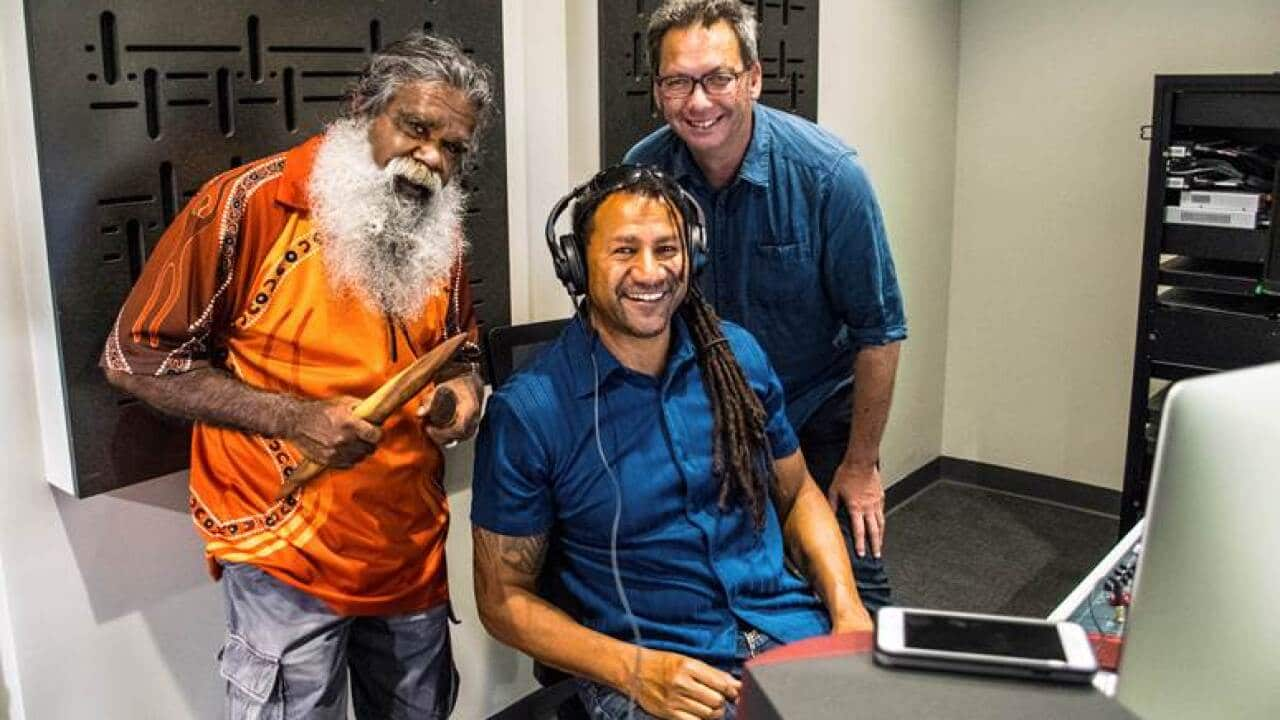Sitting around a crowd of traditional Kaiadilt elders, Indigenous women, Lulu Durretnuthi is proud to be able to understand much of the conversation spoken in the traditional Kayardild language. But looking around and listening to their stories, she knows in order to preserve their culture; she needs to learn how to speak more of it.
The Kaiadilt are from Bentinck and Sweers islands in the Gulf of Carpentaria but now most community members live on Mornington Island.
Lulu grew up in an environment where she’d often hear words of her traditional language spoken by her mother and relatives, but due to westernisation, their language was soon replaced with English. “I feel lost that I haven’t had my language… My Mum spoke a bit of it to me growing up, but I feel a bit sad that it wasn’t carried on because we are all into English,” she says.
“I feel lost that I haven’t had my language… My Mum spoke a bit of it to me growing up, but I feel a bit sad that it wasn’t carried on because we are all into English,” she says.

Lulu and Nick Source: ANU
But now, a new language revival-project is underway to repatriate recordings in Kayardild back to the community and to hold discussions about those recordings.
“We’re trying to save it now… it’s pretty hard going but I’m proud of myself; I do understand it when the old girls speak it.”
Lulu said the project is a smart way to learn more of the language.
“I have definitely picked up a lot. The old girls were surprised I can say a lot of the words.”
Apart from learning more of the Kayardild language, one of the main advantages of it is feeling more connected to culture, country and elders. Lulu said this as she describes listening to a recording of her grandfather, her mother’s father.
“It was good to actually hear his voice again,” she says.
“Some of the words he was using I didn’t understand… sometimes they speak too fast but it is all fun. There’s a lot of laughter.” Lulu says one story in particular from her grandfather who spoke about a flood on Bentinck, sparked a great deal of discussion, questions and laughter after the Kaiadilt tribe listened to it.
Lulu says one story in particular from her grandfather who spoke about a flood on Bentinck, sparked a great deal of discussion, questions and laughter after the Kaiadilt tribe listened to it.

Amy Loogatha - one of the most fluent speaking survivors Source: ANU
“We were half way through it; grandfather was telling a story of two survivors, only two men!” she continued giggling.
“It is impossible that we all came from two men!”
The language-revival project is being run by the Kaiadilt community and Mirndiyan Gununa Aboriginal Corporation and funded by the Department of Communications and the Arts through the Indigenous Languages and Arts Project.
Recordings of elders speaking in language were produced in the early 1980s by ANU Professor Nick Evans and now, 30 years later, Mr Evans’ is repatriating those very same recordings - which have also been shared by the Australian Institute of Aboriginal and Torres Strait Islander Studies. Evans is now the Director of the based at the ANU but back in 1982 on a mission to preserve culture and language, as a PhD student, he began establishing life-long bonds with the Kaiadilt community and working hard to build a corpus of their language.
Evans is now the Director of the based at the ANU but back in 1982 on a mission to preserve culture and language, as a PhD student, he began establishing life-long bonds with the Kaiadilt community and working hard to build a corpus of their language.

headphones to listen to recordings Source: AAP
“It brings back a lot of memories to listen to these recordings again with the community,” he says.
“We’ve had a fair few Kaiadilt people up here doing this language. It’s deadly, especially listening to my grandfather.”
“The challenge now is to take this rich body of recordings, to transcribe and translate more of them, and to archive them in a way that will make it easier for community members to find recordings that are special for them or their families.”
The recordings are currently being distributed to the community on USB sticks and micro SD cards, which can be easily accessed via mobile phone and listened to immediately. But the community soon became enthusiastic about plans to construct an online archive as a more stable form of storage.
Lulu says all the work going on around the recordings is hugely useful.
“Since last week we’ve had a fair few Kaiadilt people up here doing this language. It’s deadly, especially listening to my grandfather.” For many elders this isn’t the first time they’ve heard these stories, but that doesn’t mean they don’t enjoy taking a stroll down memory lane.
For many elders this isn’t the first time they’ve heard these stories, but that doesn’t mean they don’t enjoy taking a stroll down memory lane.

Senior community elder Roger Kelly Source: ANU
Senior community elder Roger Kelly was just a young man listening when the stories were originally told and recorded.
“My family is in there, so I like to hear all the old stories that our old people tell because it’s from our country.”
While on the island, Evans is also working with colleague Ben Foley on a Kayardild dictionary application for smart devices. Their aim is to draw material, largely from the Kayardild dictionary and thesaurus he published in 1992.
Evans says he’s excited that younger Kaiadilt’s, like Lulu, are being given a chance to listen to the stories of their grandparents.
“Projects like these are hugely important because of the interest generated and the fresh discussions ignited. We’re having great fun up here on Mornington.”
RECOMMENDED ARTICLES:

Baby names helping Indigenous languages live on





